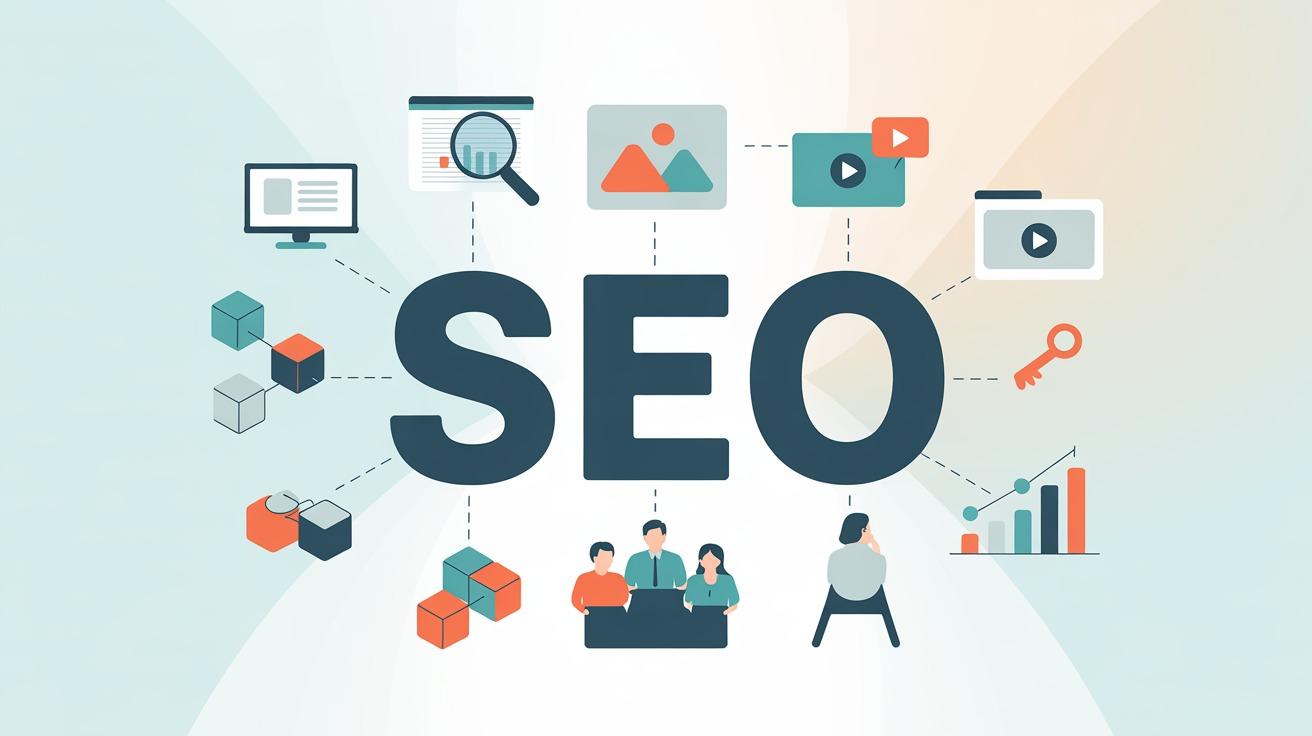Understanding what SEO is has never been more crucial for digital success, with organic search delivering a massive 53% of all website traffic. In a world where 8.5 billion Google searches happen every day, mastering search engine optimization remains the cornerstone of online visibility.
The SEO landscape has dramatically evolved beyond simple keyword stuffing. The industry’s value is projected to reach $122.11 billion by 2028, reflecting its growing significance in digital marketing. In 2025, SEO means adapting to new realities. Search behavior is changing, with more users exploring platforms like Amazon and TikTok for product discovery and information, alongside traditional search engines.
This guide cuts through the noise to show exactly what works in SEO today. You’ll learn proven strategies that deliver results and how to avoid outdated tactics that could hurt your rankings. Whether you’re new to SEO or refining your current strategy, this comprehensive guide gives you practical insights to thrive in 2025’s competitive search landscape.
What SEO Really Means in 2025

SEO remains the cornerstone of online visibility in 2025, despite the ever-evolving digital landscape. At its core, SEO helps search engines understand your content and connects it with users seeking relevant information. As businesses continue to compete for attention online, understanding the nuances of search marketing has become more crucial than ever before.
SEO vs SEM vs PPC: Clearing the confusion
Many marketers struggle to distinguish between these interconnected terms. SEO focuses on optimizing your website to appear higher in organic search results without direct payment for placement. Meanwhile, SEM (Search Engine Marketing) serves as an umbrella term encompassing both organic SEO efforts and paid search activities.
PPC (Pay-Per-Click) represents the paid advertising component where you pay only when users click on your ads. While SEO works gradually to build sustainable traffic, PPC delivers immediate visibility but stops generating traffic once you stop funding campaigns. Notably, organic search is responsible for 53% of all site traffic compared to paid search at just 15%, demonstrating the value of a balanced approach.
Why SEO Remains Essential to Digital Marketing
Despite the rise of alternative marketing channels, SEO continues to prove its worth. An impressive 89% of marketers confirm SEO’s effectiveness in their digital strategies. Furthermore, 75% of users never venture beyond the first page of search results, making top rankings essential for visibility.
Unlike paid advertising that disappears when budgets run dry, properly executed SEO creates sustainable results that improve over time. Additionally, SEO builds trust. Websites that rank well are generally perceived as more authoritative and credible, which are qualities search engines aim to reward.
What is SEO optimization in today’s context?
Modern SEO transcends simple keyword insertion. In 2025, optimization focuses on delivering exceptional user experiences through fast-loading pages, mobile responsiveness, and intuitive navigation. Technical fundamentals such as clean code, structured data, and secure connections ensure search engines can efficiently crawl and index your content.
Content quality now outweighs keyword density as Google prioritizes helpful, relevant information that addresses user intent. Meanwhile, Google’s E-E-A-T guidelines (Expertise, Experience, Authoritativeness, Trustworthiness) have become central to content evaluation, emphasizing the need for genuine expertise and real-world experience in your content.
What Actually Works in SEO Today

In 2025, effective SEO strategies focus on quality over quantity, prioritizing user needs instead of manipulation tactics. The old playbook of keyword stuffing and technical tricks has given way to more sophisticated approaches that align with search engines’ advanced algorithms.
1. Prioritizing user intent over keyword stuffing
Today’s SEO shifts from keyword-focused to user-focused optimization. Instead of exact phrase matching, successful content addresses the underlying questions and needs driving searches. Google’s systems now evaluate how users engage with your content, not just whether they click but also how they interact with it after arriving. This means creating content that genuinely satisfies searchers’ goals.
2. Creating helpful, original content
E-E-A-T (Experience, Expertise, Authoritativeness, Trustworthiness) now forms the foundation of quality content evaluation. Google’s systems actively seek original information, rating content on its uniqueness and value. According to multiple sources, content should provide original information, reporting, research, or analysis rather than simply summarizing what others say. Your content must demonstrate first-hand expertise and depth of knowledge to truly resonate with both users and search engines.
3. Optimizing for mobile and page speed
With mobile accounting for 58% of all searches, mobile optimization is non-negotiable. Google’s mobile-first indexing means your site’s mobile version determines your rankings. Responsive design is ideal because it serves the same HTML code regardless of device while adjusting the display based on screen size. Page loading speed also significantly impacts rankings. Google recommends mobile sites load in under three seconds.
4. Building topical authority through internal linking
Strategic internal linking creates a clear hierarchy and logical information flow across your site. By connecting related content through thoughtful link placement, you demonstrate the breadth and depth of your understanding on specific topics. This pillar-cluster approach helps search engines recognize your site as an authoritative source in your niche.
5. Using structured data for better visibility
Structured data helps search engines understand your content’s context and can enable rich results that stand out in search listings. Companies implementing structured data have seen impressive results. Rotten Tomatoes reported a 25% higher click-through rate for pages enhanced with structured data, consequently increasing engagement and visibility.
6. Leveraging high-quality backlinks
Above all, focus on acquiring links from trusted, authoritative websites related to your industry. A single quality backlink often outweighs numerous low-quality ones. In fact, links from various referring domains correlate with Google rankings more than any other factor, making diversified, high-quality backlinks essential for SEO success.
How SEO Has Evolved (and What No Longer Works)

The SEO playbook has been completely rewritten over the past decade. Search engines have evolved from simple keyword-matching systems to sophisticated platforms powered by advanced algorithms and artificial intelligence. What worked in SEO’s early days can now actively harm your rankings.
Outdated tactics to avoid in 2025
The “wild west” era of SEO is long gone. Formerly effective techniques like keyword stuffing (cramming keywords unnaturally into content) now trigger penalties instead of rewards. Similarly, link-building schemes using low-quality directories, link farms, and comment spamming have become counterproductive. Meta tag manipulation was once a key strategy but is now ineffective. Google has confirmed that keyword meta tags have not been used for ranking since 2009.
Creating separate pages for slight keyword variations is another obsolete practice. Following Google’s Hummingbird update in 2013, the algorithm became adept at identifying synonyms and searches with similar intent. Subsequently, the “one page per topic” approach replaced the wasteful “one page per keyword” strategy.
The rise of AI-generated search results
As of mid-2025, AI Overviews now appear on approximately 13 to 14 percent of search engine result pages, marking a steady rise in their usage. These AI-generated snippets typically draw from high-ranking, authoritative sources and occupy prime real estate in search results.
Google accepts AI-generated content as long as it’s useful and original. Their official guidance makes it clear that quality matters more than how content is created. AI that simply rewords existing material without adding value is unlikely to rank.
Why keyword density is no longer a ranking factor
Keyword density used to be an important part of SEO, but it no longer plays a significant role. Pre-2010, stuffing 5-10% of text with target keywords could boost rankings. Nevertheless, as far back as 2011, Google’s Matt Cutts warned that using keywords more than a few times per page provides no additional value.
Today’s algorithms prioritize semantic relevance and user intent over mathematical keyword ratios. Search engines now examine synonyms, related concepts, and the entire context of content. Moreover, modern SEO places greater emphasis on addressing user questions naturally through conversational language.
Future-Proofing Your SEO Strategy

As search technology races forward, staying ahead of SEO trends becomes crucial for maintaining visibility. Future-proofing your strategy means adapting to emerging technologies that are reshaping how users find information online.
Understanding generative engine optimization (GEO)
GEO refers to optimizing your content for AI-driven search engines and large language models (LLMs). This emerging practice focuses on getting your brand mentioned in AI search tools like ChatGPT, Perplexity, and Google’s AI Overviews. With ChatGPT boasting over 400 million monthly active users and Perplexity’s search volume surging by 204.77% year-over-year, optimizing for these platforms is becoming essential.
Key GEO practices include:
- Creating comprehensive, authoritative content that AI tools reference
- Using structured data to provide precise context about your content
- Establishing your brand as an entity in Google’s Knowledge Graph
- Leveraging public APIs to increase chances of AI tools citing your content
Optimizing for voice and visual search
Voice search is becoming increasingly popular, with more people using voice assistants for their daily searches. For voice optimization, focus on conversational language patterns and question-based content. Structure your content to directly answer common queries, as voice searches are typically phrased as complete questions rather than keywords.
For visual search, maintain high-resolution product images from multiple angles. Add structured data, descriptive alt text, and appropriate image titles to help visual search engines understand and index your images.
How to do SEO for AI-driven platforms like ChatGPT and Gemini
AI platforms prioritize different elements than traditional search engines. To optimize for them:
- Rank well in traditional search, as AI tools often reference high-ranking content.
- Include statistics, quotes, and data points, as AI systems frequently cite specific facts.
- Establish topical authority by creating comprehensive content on your areas of expertise.
Tracking performance with the right tools
Monitoring AI-driven traffic requires new approaches. Set up custom segments in Google Analytics to isolate traffic from AI sources. Track referred traffic from platforms like Perplexity, ChatGPT, and Gemini. Beyond volume metrics, analyze how AI-referred users engage with your site by measuring bounce rates, time on page, and conversion rates.
Conclusion
SEO has come a long way from its keyword-stuffing beginnings. Today, success depends on meeting user intent, producing high-quality content, and maintaining strong technical foundations. Search engines now prioritize genuine value over outdated tactics.
With AI changing how people search, businesses must stay adaptable. The most effective strategies combine proven SEO methods with newer practices like GEO. Companies that succeed are those that optimize for both traditional search and AI-driven platforms.
This shift calls for more than just technical skills. Focus on building expertise, showing real-world experience, and creating content that solves real problems. SEO is most effective when it is treated as a long-term effort to serve users, not just to rank.
If you need help planning your next steps, contact us today. We can build a strategy that matches the demands of modern search. Earning visibility through value will always outperform shortcuts.


